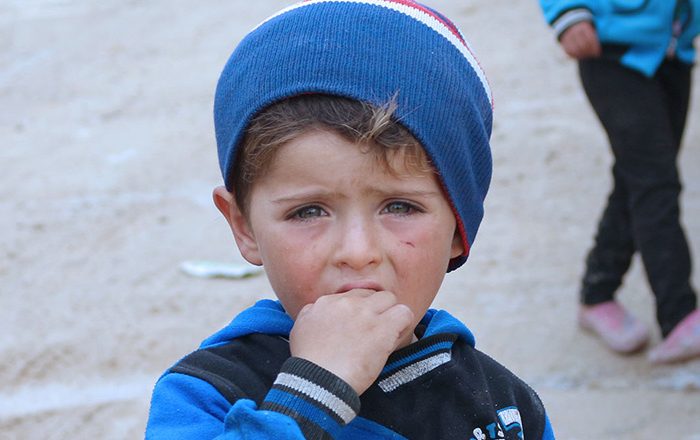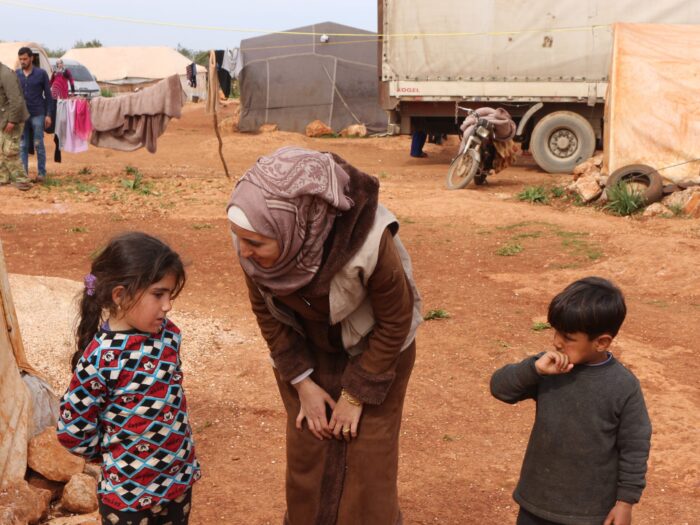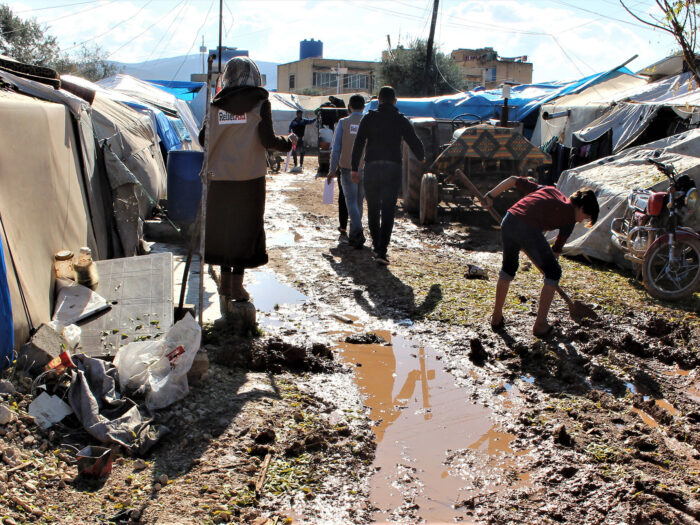
Our work in Syria
We are providing shelter for families who have been forced to leave their homes due to the conflict in Syria.
Almost 1 million innocent people have fled violence in Idlib, Syria since December 2019. Families are being squeezed into a smaller and smaller area, with the border to Turkey closed and government forces pushing to reclaim territory.
We are working to help thousands of families in Idlib who need emergency shelter.
Meet Bana, 27, a humanitarian aid worker in Idlib for the last five years. She works for our partner ReliefAid and is the only woman in the team. She tells us about what keeps her motivated as a humanitarian when conflict is so close to home.
I hope the war will end, and people will return to live in their warm homes. I wish for my family stability and safety and that I can raise my children in a calm world away from fear.
Bana


Can you tell us a little about your family?
I got married three years ago. I have a girl named Sima and now I am pregnant with another child. My husband works in civil defence and we both help people and do everything we can to make them feel safe. I love my family very much and try and forget the war when I am with my child and my husband.
Does being a mother influence how you feel about the families you help?
Yes a lot, when I see children in camps and their suffering in the winter and cold and they cannot keep their clothes clean because mud covers the camps. In the summer they are at risk from scorpions and snakes. I feel very sad especially when I see children of the same age as my daughter living in this state.
Help Families NowWhat is home like?
My current home is small and beautiful. Sometimes I feel safe and sometimes we feel fear because danger is close to us.
Have you had to move home during the conflict?
Yes, I left my home twice because of the heavy bombing of my village and we had to move to the neighbouring village for more than two weeks.
We had no shelter and spent these difficult days hoping to return to our home. In the end we returned, but our house was partially destroyed because of that bombing.
What did you dream of doing when you were younger?
I dreamed of traveling to other countries and getting to know other peoples’ cultures. I love to travel a lot.
The war has made us live in very bad conditions. Before the war, we aspired to have a large house and permanent work, now our lives are far from the dreams we were planning.
What are your hopes and dreams now?
I hope the war will end, and people will return to live in their warm homes, and I wish for my family stability and safety and that I can raise my children in a calm world away from fear.
Our Work In SyriaI have a relationship of affection and respect with the people we help, belonging to the same country and the same pain. Although I do not know them, I love them very much.
Bana
Is there anything that brings you moments of joy, laughter and hope?
The only thing that brings me hope and joy is my child. When the doors shook from the sounds of missiles and aircraft flying at first my child was frightened. But since I told her that this noise is the voice of the wind she has been better. Now when she hears the sound of aircraft she comes to tell me “Mama do not be afraid, this voice is the wind not a flying sound”.


Why did you choose to do humanitarian work?
Because I love to help. I cannot look at the war and what is happening to families without trying to help and being human.
Do you feel people think differently about female humanitarians in Syria, compared to male team members?
There is no difference between a man and a woman in humanitarian work, but women feel more comfortable talking to a woman than talking to a man.
Where do you work?
I work with the team in the Syrian north camps. Sometimes the camps are far away and the road is long and tiring but I feel happy when I help people. I see the children in the camps, I play with them and we walk together and I enjoy hearing their laughter.
What is a typical day like at work?
Activities in the camp vary from day to day. I could be carrying out needs assessments, distributing aid or working with families to monitor how the aid is being used and how effective it is. I also speak to women to record their stories so we can share them with supporters.
I spend a lot of time talking with women in the camps, especially if they’re on their own. It’s my job to help people understand how to best use the items we give them and I’m the main point of contact for questions or concerns. I talk to women and ask them about their needs and problems. We try help them as much as possible.
What makes you feel proud, or like you have done a good day’s work?
The thing that makes me proud is that I am helping my people, and I feel my day was good after a day of distributing aid that people really need.
I have a relationship of affection and respect with the people we help, belonging to the same country and the same pain. Although I do not know them, I love them very much.
Read More Stories